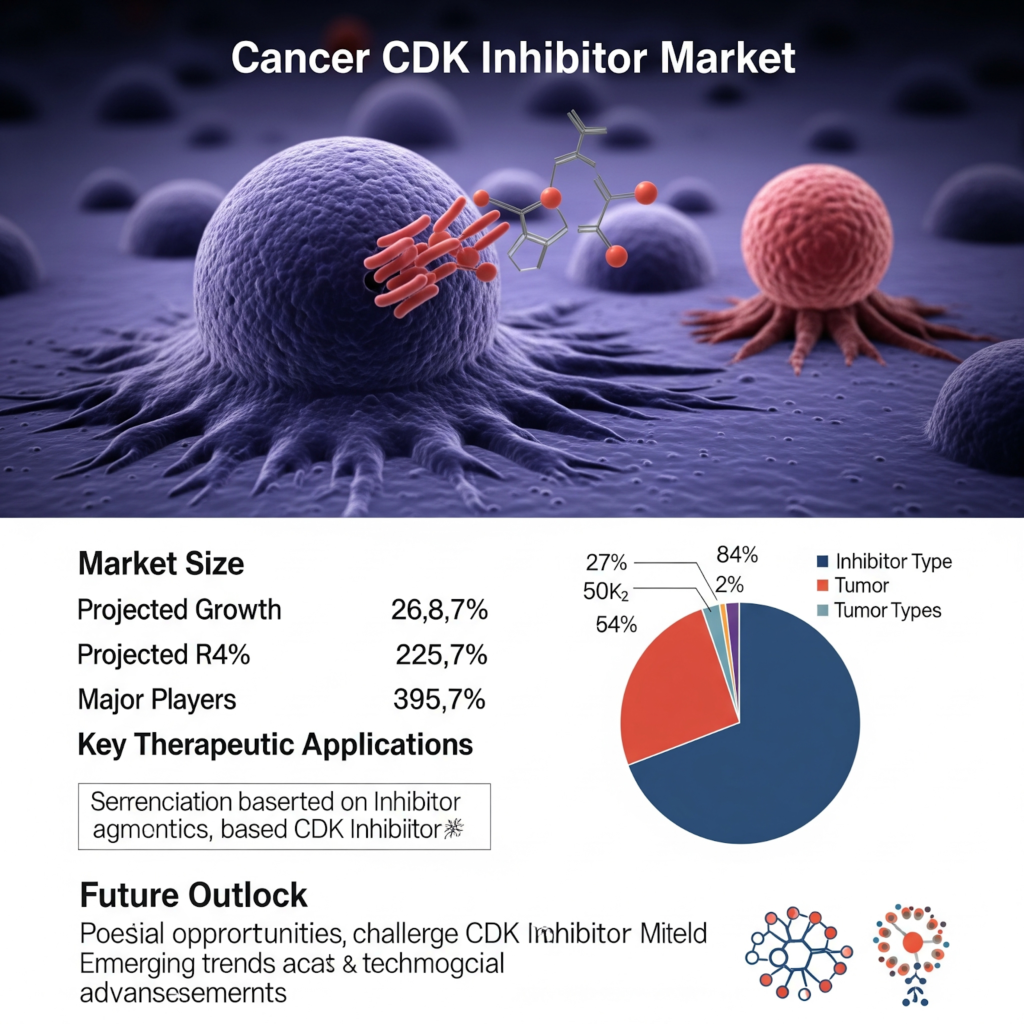
The global cancer CDK (Cyclin-Dependent Kinase) inhibitor market is rapidly evolving with the rise of targeted therapies for hormone receptor-positive (HR+) and HER2-negative breast cancers. CDK inhibitors, designed to disrupt cancer cell division by targeting regulatory kinases, have transformed treatment protocols and significantly improved progression-free survival rates for patients.
As oncology moves toward precision medicine, CDK inhibitors such as Palbociclib, Ribociclib, and Abemaciclib are becoming standard additions to hormone therapy regimens in advanced breast cancer. These drugs selectively inhibit CDK4/6, preventing cell cycle progression and slowing tumor growth, especially in cancers driven by uncontrolled cell proliferation.
According to Prophecy Market Insights, the market is segmented by Drug Type and Distribution Channel, with Palbociclib leading due to its earlier approval and broad clinical adoption across multiple lines of therapy.
Explore Full Cancer CDK Inhibitor Market Report
Drug Landscape: Innovation in CDK Inhibition Expands Beyond Breast Cancer
The CDK inhibitor class is expanding its therapeutic footprint beyond breast cancer into other solid tumors such as lung, prostate, and ovarian cancers. With new clinical trials underway, drugs like Abemaciclib are being evaluated for monotherapy use and in combination with checkpoint inhibitors and endocrine therapy.
Ribociclib, marketed by Novartis, has shown strong efficacy in postmenopausal women and premenopausal patients with HR+/HER2− breast cancer. Meanwhile, Palbociclib, developed by Pfizer, remains a front-runner in first-line treatment protocols and continues to explore label expansions.
As resistance to traditional endocrine therapy emerges, CDK inhibitors are increasingly used to delay chemotherapy initiation, reduce tumor burden, and improve quality of life for cancer patients. Pharmaceutical companies are actively investing in next-generation CDK inhibitors with greater selectivity and improved safety profiles.
🔗 Request a Sample Copy of This Market Report
Distribution Channels: Hospitals Remain Primary Dispensing Hubs
By Distribution Channel, the market includes Hospital Pharmacies, Online Pharmacies, and Others. Hospital pharmacies dominate this segment, as cancer CDK inhibitors are primarily administered through specialist oncologists within hospital or clinic settings, particularly for newly diagnosed and high-risk patients.
However, online pharmacies are gaining traction in regions with digital health infrastructure and home-based care trends. As long-term use of oral CDK inhibitors becomes common, particularly in maintenance therapy settings, digital prescriptions and home delivery models are becoming more viable and attractive.
“Others” include specialty cancer clinics and pharmacy benefit management (PBM) providers that streamline patient access, improve compliance, and coordinate reimbursement for these high-cost therapies.
🔗 Customize the Report for Strategic Business Insights
Key Players Shaping Innovation and Market Expansion
The cancer CDK inhibitor market is currently led by a few pharmaceutical giants, but innovation from smaller biotech firms is increasing competition and clinical diversity. Notable market players include:
- Pfizer Inc.
- Novartis AG
- Eli Lilly and Company
- Roche
- Sanofi
- Astex Pharmaceuticals
- Bristol-Myers Squibb
- Onconova Therapeutics, Inc.
- AstraZeneca
- Merck & Co., Inc.
These companies are investing in combination therapies, biomarker-driven trials, and regulatory expansion in emerging markets to tap into broader patient pools. Additionally, partnerships with academic research centers are accelerating the pace of innovation.
Outlook and Analyst Insight
North America holds the largest share of the global cancer CDK inhibitor market due to its robust clinical infrastructure, strong R&D investments, and early adoption of breakthrough oncology drugs. Europe is not far behind, with widespread reimbursement support and increasing use of personalized therapies. Asia-Pacific is emerging as a key growth region, driven by rising cancer incidence and growing access to advanced treatments.
“CDK inhibitors have redefined cancer treatment by offering targeted, tolerable, and effective options for patients with advanced malignancies. The future lies in expanding indications and improving affordability,”
says Riya B. More, Research Associate at Prophecy Market Insights.
This comprehensive report provides detailed analysis of drug performance, regulatory pathways, distribution shifts, and the strategic direction of leading players in the CDK inhibitor space.
The macro analyst desk brings highly sought after financial news based on market analysis, insider news and company filings.
